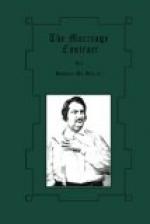To understand the situation into which Paul de Manerville was about to enter we must think of him as he was at this moment, floating upon the ocean as he floated upon his past, looking back upon the years of his life as he looked at the limitless water and cloudless sky about him, and ending his reverie by returning, through tumults of doubt, to faith, the pure, unalloyed and perfect faith of the Christian and the lover, which enforced the voice of his faithful heart.
It is necessary to give here his own letter to de Marsay written on leaving Paris, to which his friend replied in the letter he received through old Mathias from the dock:—
From Comte Paul de Manerville to Monsieur
le Marquis Henri de
Marsay:
Henri,—I have to say to you one of the most vital words a man can say to his friend:—I am ruined. When you read this I shall be on the point of sailing from Bordeaux to Calcutta on the brig “Belle-Amelie.”
You will find in the hands of your notary a deed which only needs your signature to be legal. In it, I lease my house to you for six years at a nominal rent. Send a duplicate of that deed to my wife. I am forced to take this precaution that Natalie may continue to live in her own home without fear of being driven out by creditors.
I also convey to you by deed the income of my share of the entailed property for four years; the whole amounting to one hundred and fifty thousand francs, which sum I beg you to lend me and to send in a bill of exchange on some house in Bordeaux to my notary, Maitre Mathias. My wife will give you her signature to this paper as an endorsement of your claim to my income. If the revenues of the entail do not pay this loan as quickly as I now expect, you and I will settle on my return. The sum I ask for is absolutely necessary to enable me to seek my fortune in India; and if I know you, I shall receive it in Bordeaux the night before I sail.
I have acted as you would have acted in my place. I held firm to the last moment, letting no one suspect my ruin. Before the news of the seizure of my property at Bordeaux reached Paris, I had attempted, with one hundred thousand francs which I obtained on notes, to recover myself by play. Some lucky stroke might still have saved me. I lost.
How have I ruined myself? By my own will, Henri. From the first month of my married life I saw that I could not keep up the style in which I started. I knew the result; but I chose to shut my eyes; I could not say to my wife, “We must leave Paris and live at Lanstrac.” I have ruined myself for her as men ruin themselves for a mistress, but I knew it all along. Between ourselves, I am neither a fool nor a weak man. A fool does not let himself be ruled with his eyes open by a passion; and a man who starts for India to reconstruct his fortune, instead of blowing out his brains, is not weak.




